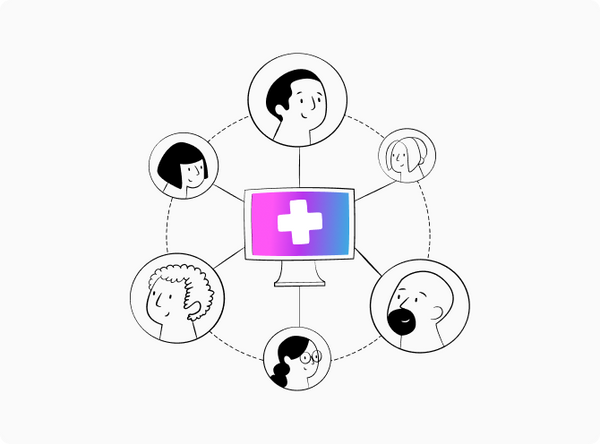
Ever since telehealth became a major part of the healthcare industry, telemedicine companies began to face various legislative issues of telehealth. In some cases, it was indeed about the violation of established legislative procedures.
In other cases, however, it was due to the fact that some legislative guidelines were loose or incomplete. This resulted in the appearance of gray areas where requirements and definitions get interpreted differently, basically based on how a company sees them.
In this post, we'll go over the ethical and legal challenges of telemedicine. Plus, we’ll show what one should keep in mind during app development to minimize the legal risks of telemedicine.
Most Common Regulatory Issues in Telemedicine
Multiple licenses might be required
This is one of the significant regulatory issues in telemedicine as it directly affects physicians and healthcare institutions that provide their services via telehealth platforms.
Different countries and states may have their own licensing procedures and requirements for healthcare professionals. Meaning that if the doctor has their medical license issued in one particular country (or US state), they may not be eligible to provide services in another country (or state) until they obtain a medical license for that particular region. This imposes additional burdens on doctors who want to start working with patients remotely.
Legislative confusions
In many cases, telemedicine companies de facto operate in a 'legal gray zone' because governments themselves have not yet decided how telehealthas an industry should be approached. This often leads to legislative confusion where different areas within telemedicine are regulated differently.
For example, some countries approach telehealth as "medicine practice at distance", whereas telepsychology is not considered as such (by established legislative acts). So, in these cases, the telepsychology products will be subject to different or additional regulations.
Privacy risks
One of the major concerns that kept people away from using covid apps during the coronavirus pandemic was a lack of understanding of how their personal data would be processed and who would have access to it. With the further development of the telemedicine industry and remote-patient monitoring (RPM) solutions, in particular, this problem evolved even further.
For example, how to make sure that the RPM wearables used by a patient don't pick up any additional information and just that which is needed for healthcare monitoring? Especially since such devices can also tell when the patient gets home or detect interactions with family members, etc.
So, in order to mitigate legal ethical issues of telemedicine, it's important for companies to make sure users stay 100% aware of how their data is used. Plus, the user needs to know what security policies a company has in place to keep the user's information protected.
Malpractice concerns
Aside from the legislative confusion that may occur due to bureaucratic definitions, there's also a real problem with unlicensed medical practices. The booming growth of telemedicine brought into the market many startups with no prior experience in healthcare. This, in turn, has led to cases where medical services were in fact provided by unlicensed doctors.
Here, however, it's up to startup founders to structure their products and platforms in a way that would keep the people without valid medical licenses away. This also includes specialists who try to act beyond their defined scope of practice. In most US states it is considered a crime.
Lack of telemedicine training
Lack of training simply means doctors and healthcare institutions do not know how to correctly operate the telemedicine solutions to avoid most of the challenges, especially those telemedicine legal issues described above.
This problem can be addressed in several ways. The telemedicine companies themselves should familiarize medical institutions with their products by holding product promos, video conferences, etc. Additionally, governmental authorities should also be involved in this process, running research programs and seminars, and carrying out job supervision.

Telemedicine Legal Issues and Regulations: Examples
HIPAA compliance
Health Insurance Portability and Accountability Act (HIPAA) is the legislation document that the US government established in 1996 to improve the efficiency of the healthcare system by improving personal data protection policies and procedures.
The HIPAA consists of five major sections or titles. Their aim is to improve health insurance coverage for individuals who have lost their job, to set standards for the processing of electronic healthcare transactions, offer guidelines regarding taxes in medical care, and so on.
FTC Act
Those who are about to launch their telemedicine product on the US market should also consider the Federal Trade Commission (FTC) Act. This document aims to prevent fraudulent actions or procedures that may occur in healthcare.
Even though it was established back in 1914, it remains relevant today and is applied to telemedicine products as well. For example, it specifies that the company (read developers) cannot make false claims as to the security and reliability of their healthcare product or service (read telemedicine app).
Telemedicine Laws in the EU
While in the US the telemedicine acts may vary state by state, in the EU they also may vary by country. At the federal level, however, in 2012 the EU Commission started working on a special framework that would cover all the laws and regulations for telemedicine. This set of rules specifies the cross-border right of all EU citizens to have access to healthcare and sets the basic standards for delivering telemedicine services in the EU.
Telemedicine Laws in the UK
As of now, the UK has no specific legislative documents or procedures that address telemedicine. The use of such products and services is currently regulated in the same fashion as traditional healthcare by the Care Quality Commission (CQC). An independent regulator that carries out regular inspections of healthcare providers.
Regulations Amidst COVID-19
During the coronavirus pandemic and strict lockdowns, many people lost access to traditional healthcare services. This led federal authorities across different countries to revisit telemedicine legal considerations. Some regulations were relaxed to bridge the existing service gap and to reduce the load on the hospitals that were extremely busy servicing patients with covid19.

How to Avoid Telehealth Legal Issues During App Development
The primary recommendation for avoiding telehealth regulatory issues during app development would be to maintain legislative compliance with respect to the region or state in which you're going to run your product.
If you have already started working on your project, make sure the workflow and all development procedures stay aligned with the regulatory requirements that you need to comply with.
If your platform offers live consultations with doctors, avoid telemedicine regulatory issues and make sure all physicians have a valid medical license and are eligible to work with patients in the area where your platform operates.

Consider Lunka.tech Your Partner
Our team always strives to deliver the best telemedicine app development services, no matter what the project budget or complexity. We always stay completely open about our procedures and policies and don't shy away from sharing the results of our work. In our portfolio, you can see a selection of projects our team has worked on so you can see that we always deliver to the client's full expectations.

Final Thoughts
Hopefully, by now you have a better awareness of all you need to know about legal considerations for telehealth and how to mitigate telemedicine legal risks. Make sure to follow the recommendations above regarding the legal implications of telehealth medicine when creating your own telemedicine product. If, however, you struggle to cope with numerous regulations and telemedicine legal challenges, reach out to us at Lunka.tech.
Our years of work with healthcare projects has helped us to develop the necessary expertise and know-how to avoid common telehealth legal issues that startups often encounter. Contact us via our dedicated form, and we'll be happy to provide you with a free consultation!
FAQ
What are the main benefits of telemedicine?
With the help of telemedicine products, patients obtain better and faster access to medical services. It's convenient and accessible to patients with disabilities or those living in rural areas with no access to physical hospitals. Telemedicine products also save patients time and money traveling to and from the hospital for examinations or results, or to pay for medical services. Everything can be done in the app.
What are the limits of telemedicine?
Even though telemedicine comes with many advantages, it's still unable to replace in-person visits at hospitals. It may also not fit particular types of clinical services or situations. Another disadvantage is that telemedicine relies heavily on a stable connection to the Internet. Meaning if it isn't, the quality and speed of service delivery heavily decreases.
What are the challenges of a telemedicine app?
The most common challenges for the telemedicine industry are lack of public trust and privacy concerns regarding app security; the lack of integration and no unified policy regarding the use of such products. Plus, legal regulations that may greatly vary by region or state.
What does the future of telemedicine look like?
In the last three years, the telehealth industry has experienced an unprecedented boost. In 2020 alone the utilization of telemedicine products increased by 154% compared to 2019. Telemedicine apps have proven to be effective during covid19, providing a wide range of remote medical and mental health services to patients around the world. This shows that telemedicine as a niche has huge potential and legal perspectives on telemedicine will only improve in the future.


